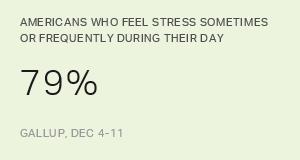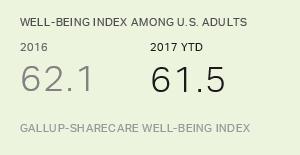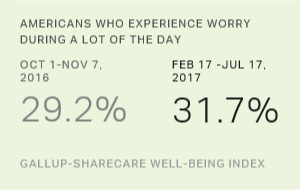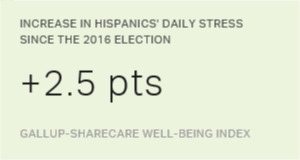Story Highlights
- Four in 10 U.S. adults (41%) say they lack the time to do all they want
- A similar proportion (44%) frequently feel stressed
WASHINGTON, D.C. -- About eight in 10 Americans say they frequently (44%) or sometimes (35%) encounter stress in their daily lives. Just 17% say they rarely feel stressed, while 4% say they never do.
| Frequently | Sometimes | Rarely | Never | ||||||||||||||||||||||||||||||||||||||||||||||||||||||||||||||||||||||||||||||||||||||||||||||||
|---|---|---|---|---|---|---|---|---|---|---|---|---|---|---|---|---|---|---|---|---|---|---|---|---|---|---|---|---|---|---|---|---|---|---|---|---|---|---|---|---|---|---|---|---|---|---|---|---|---|---|---|---|---|---|---|---|---|---|---|---|---|---|---|---|---|---|---|---|---|---|---|---|---|---|---|---|---|---|---|---|---|---|---|---|---|---|---|---|---|---|---|---|---|---|---|---|---|---|---|
| % | % | % | % | ||||||||||||||||||||||||||||||||||||||||||||||||||||||||||||||||||||||||||||||||||||||||||||||||
| 2017 Dec 4-11 | 44 | 35 | 17 | 4 | |||||||||||||||||||||||||||||||||||||||||||||||||||||||||||||||||||||||||||||||||||||||||||||||
| Gallup | |||||||||||||||||||||||||||||||||||||||||||||||||||||||||||||||||||||||||||||||||||||||||||||||||||
Although stress is common, just 41% of U.S. adults say, in answer to a different question, that they lack the time they need to do things they want. The majority, 59%, tend to think they do have enough time.
Americans were asked about their stress and time pressures in a Dec. 4-11 Gallup poll. This is the first year the questions have been updated in a decade, after being asked each December from 2001 through 2007.
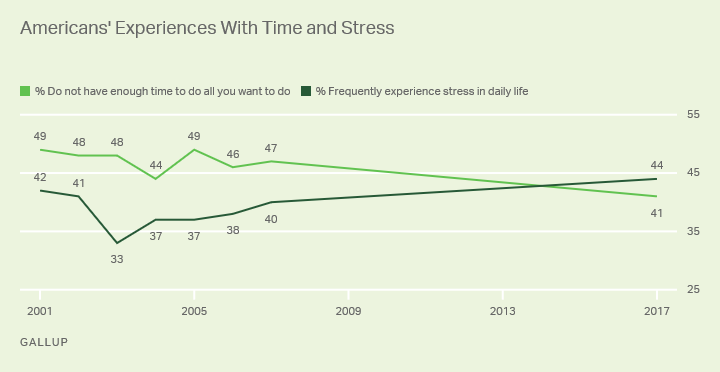
Fewer Americans today than from 2001 through 2007 say they lack sufficient time to get done what they want, although the 44% saying this in 2004 was statistically similar to today's 41%.
Americans' current stress level is similar to what Gallup found in 2001, 2002 and 2007, as well as in an earlier measurement in 1994, when 40% felt frequent stress. However, more say they experience stress now than reported this from 2003 through 2006, when between 33% and 38% felt this way.
Americans' Biggest Stressors Are Children and Work
Age is a major factor in whether one feels stressed and time-pressured. Those 50 and older -- particularly those 65+ -- are much less likely than those who are younger to say they feel stress or lack the time they need to get things done.
Relatedly, being short on time and feeling stressed are much more common experiences among employed Americans and parents of children under 18 than among adults without these significant obligations in their lives.
Women and men are about equally likely to say they lack sufficient time, but women are more likely to report frequent stress: 49% vs. 40%, respectively. Lower-income Americans are shorter on time and higher on stress than middle- and upper-income adults.
| Don't have enough time | Frequently experience stress | |||||||||||||||||||||||||||||||||||||||||||||||||||||||||||||||||||||||||||||||||||||||||||||||||||
|---|---|---|---|---|---|---|---|---|---|---|---|---|---|---|---|---|---|---|---|---|---|---|---|---|---|---|---|---|---|---|---|---|---|---|---|---|---|---|---|---|---|---|---|---|---|---|---|---|---|---|---|---|---|---|---|---|---|---|---|---|---|---|---|---|---|---|---|---|---|---|---|---|---|---|---|---|---|---|---|---|---|---|---|---|---|---|---|---|---|---|---|---|---|---|---|---|---|---|---|---|
| % | % | |||||||||||||||||||||||||||||||||||||||||||||||||||||||||||||||||||||||||||||||||||||||||||||||||||
| Gender | ||||||||||||||||||||||||||||||||||||||||||||||||||||||||||||||||||||||||||||||||||||||||||||||||||||
| Men | 39 | 40 | ||||||||||||||||||||||||||||||||||||||||||||||||||||||||||||||||||||||||||||||||||||||||||||||||||
| Women | 42 | 49 | ||||||||||||||||||||||||||||||||||||||||||||||||||||||||||||||||||||||||||||||||||||||||||||||||||
| Age | ||||||||||||||||||||||||||||||||||||||||||||||||||||||||||||||||||||||||||||||||||||||||||||||||||||
| 18 to 29 | 46 | 54 | ||||||||||||||||||||||||||||||||||||||||||||||||||||||||||||||||||||||||||||||||||||||||||||||||||
| 30 to 49 | 53 | 56 | ||||||||||||||||||||||||||||||||||||||||||||||||||||||||||||||||||||||||||||||||||||||||||||||||||
| 50 to 64 | 35 | 37 | ||||||||||||||||||||||||||||||||||||||||||||||||||||||||||||||||||||||||||||||||||||||||||||||||||
| 65 and older | 22 | 24 | ||||||||||||||||||||||||||||||||||||||||||||||||||||||||||||||||||||||||||||||||||||||||||||||||||
| Annual household income | ||||||||||||||||||||||||||||||||||||||||||||||||||||||||||||||||||||||||||||||||||||||||||||||||||||
| Less than $30,000 | 46 | 51 | ||||||||||||||||||||||||||||||||||||||||||||||||||||||||||||||||||||||||||||||||||||||||||||||||||
| $30,000 to $74,999 | 40 | 44 | ||||||||||||||||||||||||||||||||||||||||||||||||||||||||||||||||||||||||||||||||||||||||||||||||||
| $75,000 and over | 41 | 41 | ||||||||||||||||||||||||||||||||||||||||||||||||||||||||||||||||||||||||||||||||||||||||||||||||||
| Employment status | ||||||||||||||||||||||||||||||||||||||||||||||||||||||||||||||||||||||||||||||||||||||||||||||||||||
| Employed full/part time | 53 | 52 | ||||||||||||||||||||||||||||||||||||||||||||||||||||||||||||||||||||||||||||||||||||||||||||||||||
| Not employed | 28 | 36 | ||||||||||||||||||||||||||||||||||||||||||||||||||||||||||||||||||||||||||||||||||||||||||||||||||
| Children under 18 | ||||||||||||||||||||||||||||||||||||||||||||||||||||||||||||||||||||||||||||||||||||||||||||||||||||
| Have child under 18 | 55 | 58 | ||||||||||||||||||||||||||||||||||||||||||||||||||||||||||||||||||||||||||||||||||||||||||||||||||
| No child under 18 | 35 | 39 | ||||||||||||||||||||||||||||||||||||||||||||||||||||||||||||||||||||||||||||||||||||||||||||||||||
| Gallup, Dec. 4-11, 2017 | ||||||||||||||||||||||||||||||||||||||||||||||||||||||||||||||||||||||||||||||||||||||||||||||||||||
Naturally, work and family obligations have a compounding effect, so that working parents are especially likely to feel short on time and stressed. By contrast, those who neither work nor have children are the least likely to feel this way.
| Don't have enough time | Frequently experience stress | ||||||||||||||||||||||||||||||||||||||||||||||||||||||||||||||||||||||||||||||||||||||||||||||||||
|---|---|---|---|---|---|---|---|---|---|---|---|---|---|---|---|---|---|---|---|---|---|---|---|---|---|---|---|---|---|---|---|---|---|---|---|---|---|---|---|---|---|---|---|---|---|---|---|---|---|---|---|---|---|---|---|---|---|---|---|---|---|---|---|---|---|---|---|---|---|---|---|---|---|---|---|---|---|---|---|---|---|---|---|---|---|---|---|---|---|---|---|---|---|---|---|---|---|---|---|
| % | % | ||||||||||||||||||||||||||||||||||||||||||||||||||||||||||||||||||||||||||||||||||||||||||||||||||
| Employed, have child | 58 | 59 | |||||||||||||||||||||||||||||||||||||||||||||||||||||||||||||||||||||||||||||||||||||||||||||||||
| Employed, no child | 50 | 47 | |||||||||||||||||||||||||||||||||||||||||||||||||||||||||||||||||||||||||||||||||||||||||||||||||
| Not employed, have child | 47 | 54 | |||||||||||||||||||||||||||||||||||||||||||||||||||||||||||||||||||||||||||||||||||||||||||||||||
| Not employed, no child | 23 | 33 | |||||||||||||||||||||||||||||||||||||||||||||||||||||||||||||||||||||||||||||||||||||||||||||||||
| Gallup, Dec. 4-11, 2017 | |||||||||||||||||||||||||||||||||||||||||||||||||||||||||||||||||||||||||||||||||||||||||||||||||||
One piece of good news for working parents is that the decline since the mid-2000s in the percentage of Americans feeling short on time has been especially pronounced among employed Americans and is seen about equally among adults with and without children.
Bottom Line
Much has changed in the past decade, not the least of which is the proliferation of smartphones, beginning with the introduction of the iPhone in 2007. This technology may be providing some efficiencies in people's lives, such as allowing them to shop more easily from home, do their banking online, keep tabs on work while out of the office, follow the news, and much, much more -- thus enabling them to feel they are getting more done. Yet there has not been an obvious payoff in reduced stress. It's possible that some aspects of the new technology, like social media, are offsetting others in changing how much stress people experience.
Of course, many other aspects of life could factor into how Americans feel about their time and stress, including their jobs, family structure, dining habits, the economy and today's highly polarized political environment. From that perspective, despite some revolutionary and not-so-revolutionary changes in the past decade, people's time management and stress haven't changed too much.
Survey Methods
Results for this Gallup poll are based on telephone interviews conducted Dec. 4-11, 2017, with a random sample of 1,049 adults, aged 18 and older, living in all 50 U.S. states and the District of Columbia. For results based on the total sample of national adults, the margin of sampling error is ±4 percentage points at the 95% confidence level. All reported margins of sampling error include computed design effects for weighting.
Each sample of national adults includes a minimum quota of 70% cellphone respondents and 30% landline respondents, with additional minimum quotas by time zone within region. Landline and cellular telephone numbers are selected using random-digit-dial methods.
View survey methodology, complete question responses and trends.
Learn more about how the Gallup Poll Social Series works.
